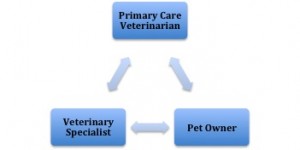To those of who read this blog regularly, you know I’m a stalwart advocate of board-certified veterinary specialists. Too often I hear pet owners state “I wish I had known about you sooner.” The fact is the average pet owners usually doesn’t know specialists are available to partner with them to to help their pets. So, this week I wanted to share more about a concept in which I firmly believe and respect: the triad of care. I hope you find the post insightful and share-worthy! Happy reading!

What is the triad of care?
The triad of care is a concept that states a pet owner, primary care veterinarian, and board-certified veterinary specialist work as a team in the best interest of a pet.
No singular component of the triad is more important than the other. Indeed, each is equally essential to ensure a pet receives the best possible healthcare. Family veterinarians unquestionably develop close and often personal relationships with pet owners. Board-certified veterinary specialists respect the bond pet owner and family veterinarian, and are committed to supporting it. Primary care doctors embrace the triad of care because the collaboration helps their patients. Pet owners should trust each doctor and not play one doctor against the other.
Embrace preventive healthcare
Early detection of medical and surgical conditions is truly important for pets, especially since they can’t speak up when there is something wrong. Too many times I’ve seen pets presented to me with a life-threatening conditions that if the family had presented the pet to their primary care veterinarian sooner, the ailments would have been relatively simple issues to address and effectively treat.
Preventive healthcare with primary care veterinarians is the most important step families can take to manage their pets’ health. Remember family veterinarians are a key component of the triad of care! Many of the top risk factors leading to illness and premature death are preventable. When pet owners proactively work with their primary care doctor, they’re making a decision to take responsibility for their pet’s health and quality of life.

Consult specialists as early as possible
Not even the most proactive preventive healthcare plan can keep away all health problems in cats and dogs. When major and/or chronic health issues arise, consultation with board-certified veterinary specialists can be helpful. Furthermore, it’s often financially beneficial to bring specialists onto a pet’s healthcare team as soon as possible in an effort to develop a logical and cost-effective diagnostic and/or therapeutic plan.
To illustrate this point, let’s look at a classic scenario. The end of the work day in referral centers is commonly called the “witching hour.” These hospitals receive a barrage of calls from primary care colleagues seeking immediate referral for patients with chronic but progressing conditions. They’ve performed some blood, urine, and diagnostic imaging tests (e.g.: radiographs/x-rays, ultrasound examinations). They’ve started therapies. But, the patient’s condition hasn’t resolved. So, the primary care doctor recommends immediate referral to a specialist to further investigate the pet’s chronic condition.

Here’s the issue with this approach. It’s the end of the day. With the exception of emergency and critical care specialists working in emergency rooms and intensive care units, other specialists are wrapping up their days. They’re getting ready to head home to spend quality time with their own two-legged and four-legged family members. So, what ends up happening is a patient who is not living with a life-threatening emergency is referred through the emergency room with an expectation the pet will be transferred to the appropriate specialist the next day.
Veterinary specialists call this tactic “back-dooring”, and it’s neither encouraged nor recommended. Why? Emergency care is expensive, and the specialist may not be available for consultations the next day. So, clients end up paying a lot of money for overnight emergency care their pet doesn’t necessarily need, and they aren’t even guaranteed their pet will be evaluated by the specialist the next day.
So, what should you do as a pet owner? Ask your family veterinarian early on if a referral to a board-certified veterinary specialist would be helpful for your pet. If the answer is yes, then pursue a referral as soon as possible. Same-day referrals happen all the time, but they don’t happen at the end of the work day. Taking a proactive approach to consult with a veterinary specialist can often help pet owners save money by embracing the triad of care early in the course of their pet’s illness.
The take-away message about the triad of care…
The triad of care is a powerful and highly effective collaborative relationship between primary care veterinarians, board-certified veterinary specialists, and pet owners. Families should follow the preventive healthcare recommendations of their pet’s primary care doctors to thwart the snowballing of minor medical problems into major ones. When a major health problem does arise, early consultation with a board-certified veterinary specialist is often in the best interest of a pet.
To find a board-certified veterinary internal medicine specialist, please visit the American College of Veterinary Internal Medicine.
Wishing you wet-nosed kisses,
CriticalCareDVM

